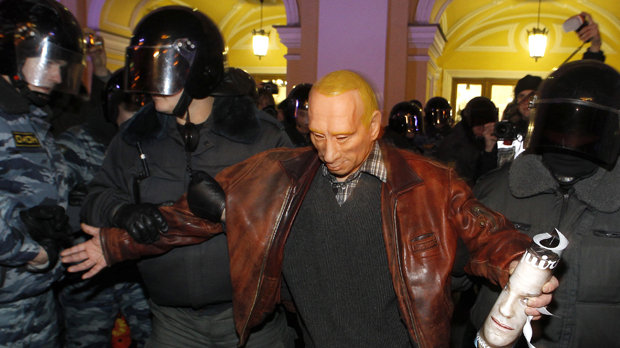Is Putin facing a ‘Russian Spring?’
As more than 30,000 people promise to protest this weekend in Russia after a disputed election result, Robin Cook’s former adviser tells Channel 4 News we are witnessing the start of “serious change”.

At least 1,000 anti-government protesters have been arrested in three cities since Sunday’s disputed parliamentary elections that indicated a victory to Vladimir Putin‘s United Russia party.
Five-hundred were reportedly been arrested in Moscow earlier this week when an estimated 8,000 people took part in one of the largest demonstrations in Russia since the fall of the Soviet Union.
Three-hundred demonstrators were detained following a smaller rally which was broken up by police, with 230 arrested St Petersburg and 25 people taken into custody in the southern city of Rostov.
But these rallies look set to be eclipsed if a planned “Day of Wrath” materialises tomorrow, after official election results are announced on Friday.
‘Unprecedented’ numbers
Thirty-one thousand people on the “Rally for Honest Elections” Facebook page say they will attend the rally, despite a government limit saying only 300 people can attend.
Activists are also calling for demonstrations in 69 other cities on social networking internet sites.
David Clarke, the director of the Russia Foundation, said that although the numbers of people dissenting are unprecedented in recent times, Saturday’s protest will be the key indicator of just how much momentum the opposition have gathered.
“It hasn’t gained the mass mobilisation we’ve seen in the Arab world yet, but it’s clear that the regime is losing its grip and it’s going to be very interesting to see what will happen on Saturday,” Mr Clarke told Channel 4 News.
“I think discontent will grow, the people have been compliant for more than a decade and there’s a clear sense that this won’t be a flash in the pan.
“There will be serious change but we don’t know how long it will take, it could even take years, but serious change is on the horizon,” he continued.
Gorbachev calls for re-run
Mikhail Gorbachev, the former premier who oversaw the end of the Soviet Union, said the first step for the Russian authorities is to annul the election result and hold a new vote.
“More and more people are starting to believe that the election results are not fair,” he told the Interfax news agency.
His comments came as Vladimir Putin accused US Secretary of State Hilary Clinton of “stirring” discontent after she expressed “well-founded” concerns over alleged election fraud.
Monitors from the Organisation for Security and Co-operation in Europe (OSCE) said on Monday that there had been “severe problems with the counting process” after the vote, citing apparent irregularities such as the stuffing of ballot boxes.
Russia’s election monitoring group, Golos – which is funded by the US and the EU – logged 5,300 allegations of electoral violations.
Repression or reform
David Clarke said he believes it is highly unlikely that Putin would concede such ground to the opposition, but he underlined how determined the protesters could be.
He said that the unrest has been brewing for years, in a “perfect storm” of structural problems revolving around economic inequality and political repression.
“The protesters think the Putin model is delivering the growth and prosperity that has been promised. And when people are feeling squeezed political and social problems become magnified.”
In the short term, however, he said the government could take two strategies: “One is to ignore the demonstrations, hoping it will lose momentum, but that could make the demonstrators lose their fear.”
“The second is to use excessive force. This would be a far more characteristic response, but it could embolden the activists, meaning it would be a very counter-productive strategy to take.